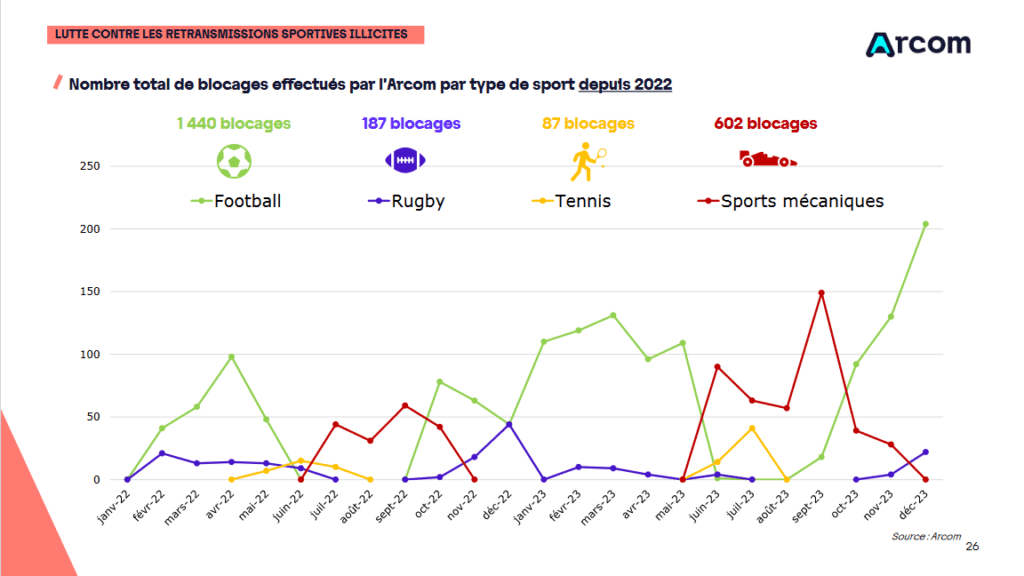Since 2022, the fight against piracy of sports matches has taken on a whole new dimension. In two years, thousands of domain names have been blocked. An efficiency to be qualified, however: according to Arcom, the use of IPTV platforms has been increasing continuously for several years.
This is one of the consequences of the new strategy to combat piracy of sports matches: never have efforts to prevent access to pirated broadcasts been so great. This is reflected in the annual report from the Audiovisual and Digital Communication Regulatory Authority (Arcom) submitted this Tuesday, April 30.
France’s renewed strategy against sports piracy is manifested through article L333-10 of the Sports Code. This offers Arcom reinforced prerogatives, which were mobilized from the beginning of 2022.
Since the start of 2022, blocking operations targeting sites which offer illegal broadcasts of various competitions (four sports are mentioned: football, rugby, tennis and motor sports) have continued to increase, mainly in due to much more sustained activism by Arcom.
The strategy followed mainly consists of blocking domain names by Internet access providers (Orange, Bouygues Telecom, SFR, Free for the most part). In doing so, Internet users who are customers of the operators concerned can no longer visit blocked sites, unless they opt for workaround solutions.
Thousands of sites blocked in two years
In 2022, 512 domain names were blocked by judicial injunction and 772 by notification from Arcom. In 2023, there were 542 legal injunctions and above all 1,544 notifications from Arcom. This makes a total of 3,370 domain names targeted, including 1,300 that are still targeted. This includes mirror sites, which redirect Internet users to blocked sites.
Unsurprisingly, the actions focus heavily on football, due to its immense popularity in France (of the 2,316 areas targeted by Arcom, 1,440 are linked to football). Motorsport comes next with 602 Arcom blockages. Rugby is in third place (187 blocks), then tennis (87).

Among the competitions receiving particular attention are Ligue 1 and Ligue 2 in France, the Bundesliga in Germany, the Premier League in the United Kingdom and major continental or global tournaments (the Champions League, the World Cup and the African Cup of Nations).
For other sports, we find the Top 14 of rurby, two Grand Slam tennis tournaments (Roland-Garros and Wimbledon) as well as Formula 1 and the Motorcycle Grand Prix. For all of these sports, Arcom has four regular contacts: the Canal+ and BeIn Sports channels and two federations (the LFP and the FFT).
One of the major challenges in the fight against sports piracy is to succeed in countering illicit broadcasting, ideally beforehand, or at worst during the match. Indeed, unlike the piracy of a cultural work, which retains its interest over time, the illegal retransmission of a match loses its value immediately after the match, once the result is known.
In this area, Arcom highlights its responsiveness. The requests it receives are processed on average within six days, without going through the courts. In some cases, this deadline is reduced to less than 24 hours, to quickly relay the information to the ISP, so that they can take immediate technical action.
Internet users do not all fall within the ranks of the legal offer
Behind the increased activity of Arcom, there remains the question of the effectiveness of these measures. If the authority rents the “ strong responsiveness » of the four major operators (SFR, Orange Bouygues Telecom, Free), she notes that the implementation of the anti-piracy plan strongly mobilizes blocking by domain name. Blocking by IP address is not currently implemented
It turns out that blocking by domain name can be circumvented with a little technique – by changing the DNS on your computer or by subscribing to a VPN offer. In both cases, this allows the ISP to be partially removed from the equation and its technical blocking measure to be rendered ineffective. Arcom has taken up this difficulty.


In fact, when faced with a site blockage, 20% of Internet users opt for a measure to circumvent the blocks (VPN or DNS). Others (30%) look for another illicit site or prefer to pay for a subscription to an IPTV solution. . Clearly, half of Internet users don’t get the point. This even goes up to two thirds in some cases.
Another challenge: the evolution of forms of piracy. If “classic” sites are still regular points of passage for accessing content outside of the legal offering, new forms are emerging, which cannot necessarily be identified or neutralized with usual strategies. This is the case for wild broadcasts on Twitch, X or Telegram.
Arcom also notes a “ slight increase in live streaming », unlike older approaches: peer-to-peer (P2P) exchanges, direct downloading or even streaming. Practices partly absorbed by the development of the legal offer, with regard to cultural content.
A phenomenon that can can be explained by the development of new methods of broadcasting such as internet television (IPTV) or the use of social networks to share links allowing illegal access to live content », confirms the report.
This reality somewhat qualifies the effectiveness of Arcom’s actions – a limit that the institution admits, through the statistics it puts forward. Thus, if the average audience of illicit services tends to decrease on the side of traditional sites, it is constantly increasing among IPTV applications. Obviously, this is a sign that Internet users are adapting.
Subscribe for free to Artificielles, our newsletter on AI, designed by AIs, verified by Numerama!
